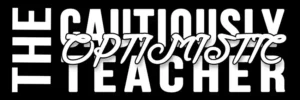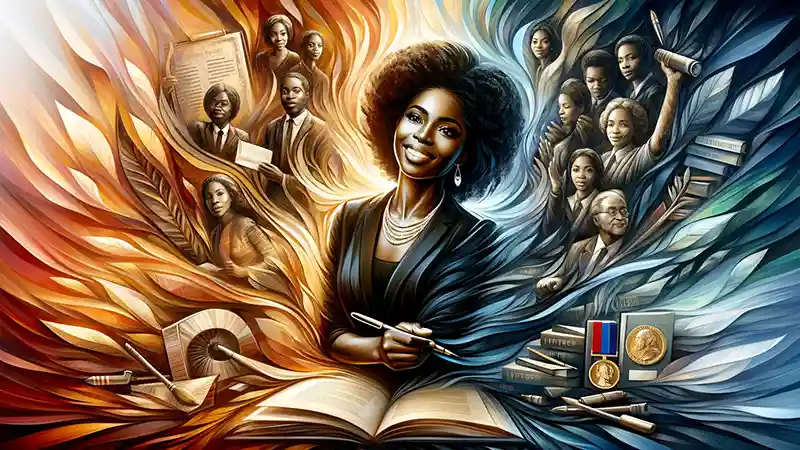In this motivational story for students, we embark on an exploratory journey into the life of Toni Morrison, an iconic figure in American literature. We will trace her path from the humble beginnings in Lorain, Ohio, to her rise as a Nobel Prize-winning author. By understanding Morrison’s background, challenges, and achievements, students will gain insight into how personal experiences and cultural heritage can influence one’s work and lead to profound contributions to society. This lesson aims to motivate students to appreciate the power of storytelling, resilience, and the impact of literature on understanding complex social issues.
Learning Goals
- I will be able to outline Toni Morrison’s early life and the influence of her upbringing on her literary works.
- I will be able to analyze Morrison’s impact on American literature and the significance of her achievements, including the Nobel Prize in Literature.
- I will be able to reflect on my own experiences and cultural heritage, and consider how storytelling can be a powerful tool for personal growth and social change.
Materials
Toni Morrison: A Journey from Lorain to Literary Greatness
In American literature, few names shine as brightly as Toni Morrison’s. Her profound and poignant novels have won her the Nobel Prize in Literature and earned her a revered place in the hearts of readers around the world. Yet, the road to becoming a monumental author began in the humble setting of Lorain, Ohio, where Morrison was born into a working-class African American family. Her early life, filled with challenges, rich cultural heritage, and a profound love for stories, shaped the voice that would later speak volumes through her literature.
Early Years in Lorain
On February 18, 1931, Chloe Ardelia Wofford, later known to the world as Toni Morrison, was born. Lorain, Ohio, was an industrial town that offered her an upbringing amidst a melting pot of cultures and races, setting the stage for her lifelong exploration of the African American experience. Her parents, George and Ramah Wofford, instilled in her a deep respect for her heritage and the power of storytelling. Her father’s tales of the South and her mother’s passion for music and folklore developed a love of stories in Morrison from a young age.
Despite her family’s financial hardships during the Great Depression, Morrison’s childhood was rich in the kind of cultural wealth that money couldn’t buy. Her family’s home was filled with African American folklore, songs, and stories that celebrated their heritage and offered a form of resistance against the racial injustices they faced.
A particularly harrowing incident occurred when her family faced financial difficulties and could not afford to pay their rent. Despite living in a segregated neighborhood, in an act of racism and retaliation, their landlord set fire to their home, leaving the Morrison family without a place to live. This act of violence was not just an attack on their physical home but also an attempt to intimidate and displace them because of their race and economic status. Despite this traumatic experience, Morrison’s family remained resilient, their spirit unbroken by the hatred they faced. This resilience against racial adversity and the strength to rebuild in the face of discrimination became a powerful theme in Morrison’s later works, reflecting the indomitable spirit of the African American community.
Education and the Love for Literature
Morrison’s journey into the world of literature began at an early age, influenced by her parents’ emphasis on the importance of education. She was an avid reader, diving into classics by authors like Leo Tolstoy and Jane Austen, and was particularly moved by the works of black authors such as W.E.B. Du Bois and Richard Wright. Her love for literature was matched by her academic excellence, which led her to Howard University in Washington, D.C., where she pursued a degree in English.
At Howard, Morrison encountered the racial dynamics of the segregated American South, which contrasted with her relatively integrated upbringing in Lorain (despite the incident with the landlord). These experiences deepened her understanding of racial identity and discrimination, themes that would later become central to her work. After graduating from Howard, she continued her studies at Cornell University, where she completed her master’s degree in American Literature, focusing on the works of Virginia Woolf and William Faulkner. These authors and her own experiences would greatly influence her writing style and thematic concerns.
Early Career and Finding Her Voice
After completing her education, Morrison embarked on a career in academia and publishing. She taught English at Texas Southern University and Howard University, where she influenced a new generation of writers and thinkers. In 1965, she broke new ground as the first African American woman senior editor in the fiction department at Random House in New York City. Her work at Random House was significant, not only for her personal growth but also for her efforts to bring African American literature into the mainstream.
During her tenure at Random House, Morrison began to write her own fiction. Her first novel, The Bluest Eye, was published in 1970. The book, which explores themes of racial identity, beauty standards, and family dynamics, was inspired by a conversation Morrison had with a childhood friend who wished for blue eyes. Though initially not a commercial success, The Bluest Eye laid the foundation for Morrison’s exploration of the African American experience, characterized by her lyrical prose and deep empathy for her characters.
Rise to Literary Prominence
Morrison’s literary career took off in the 1970s and 1980s with novels such as Sula, Song of Solomon, and Beloved. Song of Solomon (1977) won the National Book Critics Circle Award, catapulting Morrison to national acclaim and establishing her as a leading voice in American literature. However, it was Beloved (1987), an incredible tale of a mother haunted by the ghost of her daughter, set against the backdrop of slavery, that secured her place in literary history. Beloved won the Pulitzer Prize for Fiction in 1988 and was later adapted into a film.
Morrison’s storytelling, characterized by its exploration of the black experience in America, her intricate narrative structures, and her poetic command of language, resonated with readers and critics alike. In 1993, she was awarded the Nobel Prize in Literature, becoming the first African American woman to receive this honor. The Nobel Committee praised her as an author “who in novels characterized by visionary force and poetic import, gives life to an essential aspect of American reality.”
Legacy and Reflections
Toni Morrison’s journey from the small town of Lorain, Ohio, to the top of literary success is a testament to the power of resilience, the importance of one’s roots, and the power of storytelling. Her novels, which weave together the personal and the historical, the real and the imagined, continue to inspire and challenge readers to confront the complexities of identity, history, and humanity.
Morrison’s early life, with its emphasis on education, storytelling, and cultural heritage, shaped her as an individual and a writer who would go on to illuminate the depths of the human experience. Through her words, she invited us to look beyond the surface, understand the pain and beauty of life, and recognize the human spirit’s enduring strength.
As we reflect on Toni Morrison’s legacy, we are reminded of the impact of her work, her unwavering commitment to exploring the African American experience, and her role as a beacon of wisdom and insight in the literary world. Morrison’s journey from Lorain to literary greatness is a story of personal achievement and inspiration for aspiring writers and readers everywhere, encouraging us to embrace our stories and the power they hold to change the world.
Reflection and Questions
Answer at least three questions below:
- Toni Morrison grew up in a working-class family during the Great Depression, facing financial hardships and racial discrimination. Can you think of a time when you faced a challenge because of your background or circumstances? How did you overcome it?
- Morrison’s family used storytelling to preserve their heritage and cope with challenges. Have you ever used storytelling or writing as a way to deal with a difficult situation? How did it help you?
- Despite her family’s financial struggles, Morrison’s parents emphasized the importance of education. Why do you think education was so important to her family? How do you value education in your own life?
- At Howard University, Morrison experienced the stark realities of racial segregation in America, which influenced her writing. Have you ever encountered or witnessed discrimination? How did it make you feel, and what did you learn from the experience?
- Morrison found her voice as a writer while working as an editor and raising two children as a single mother. What challenges do you think she faced during this time, and how might she have overcome them? Have you ever had to balance multiple responsibilities? How did you manage?
- Many of Morrison’s novels explore themes of racial identity and beauty standards. How do you think her own experiences influenced these themes? How do you relate to the concept of identity in your own life?
- The Bluest Eye was not an immediate commercial success. How do you think Morrison dealt with the initial rejection of her work? Have you ever faced rejection or failure? What did you learn from that experience?
- Morrison achieved great success and recognition for her work, including winning the Nobel Prize in Literature. What qualities do you think contributed to her success? Are there any qualities you admire in her that you see in yourself or aspire to develop?
- Morrison’s work is deeply rooted in the African American experience and cultural heritage. Why do you think it’s important to explore and celebrate one’s cultural heritage? How does your own cultural heritage influence your identity and perspectives?
- Toni Morrison’s legacy is one of resilience, brilliance, and the power of storytelling. What kind of legacy would you like to leave? How can you use your experiences and voice to impact the world around you?


